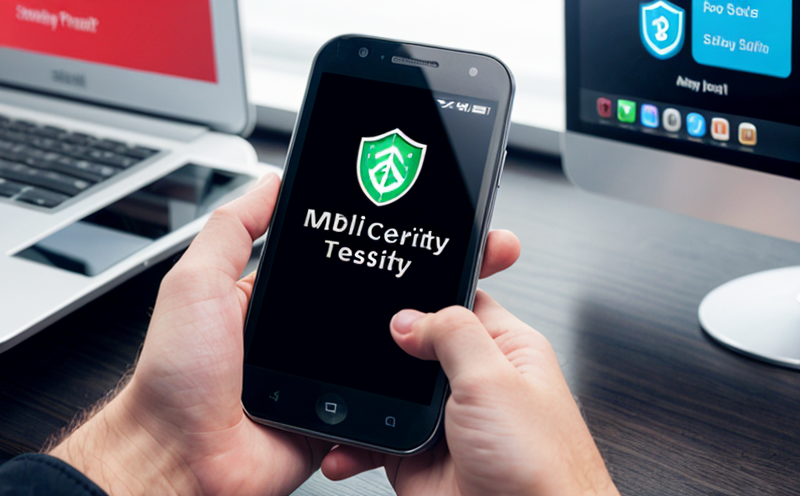HIPAA Compliance Testing in Mobile Health Applications
In today's digital landscape, mobile health applications (mHealth) are increasingly becoming integral to patient care and healthcare operations. However, with this rise comes the responsibility of ensuring that these applications meet stringent privacy and security standards, particularly those mandated by HIPAA. HIPAA Compliance Testing for mHealth applications is essential to safeguard sensitive health information from unauthorized access or disclosure.
Our service specializes in conducting comprehensive HIPAA compliance assessments on mobile health applications. This includes evaluating the security measures implemented by developers to protect patient data, ensuring that they comply with HIPAA Privacy Rule and HIPAA Security Rule. The testing process involves multiple stages, including a risk analysis to identify potential vulnerabilities, penetration testing to exploit those vulnerabilities, and finally, a review of the application’s architecture and code for compliance.
For quality managers and compliance officers, understanding the intricacies of HIPAA regulations is crucial. Our service ensures that all aspects of an mHealth app are scrutinized, from data encryption methods used in transit and at rest to the access controls implemented by the developers. We leverage industry best practices and international standards such as ISO 27001 and ISO 29155-3 to provide a robust compliance framework.
Our testing methodology is designed to be thorough yet efficient, ensuring that even the smallest details are not overlooked. This includes examining the app's data flow, user authentication mechanisms, and any third-party integrations that could pose a risk of data leakage. The results of our tests are detailed in comprehensive reports that outline all findings and recommendations for remediation.
For R&D engineers, our service offers invaluable insights into how to design mHealth applications that not only function well but also adhere strictly to HIPAA guidelines. By incorporating our testing early in the development cycle, they can avoid costly rework later on. Our team of experts works closely with developers to identify and rectify any issues promptly.
For procurement teams, ensuring compliance is critical when selecting mHealth solutions for their organization. Our service provides an unbiased evaluation of available applications, helping them make informed decisions that align with both business needs and regulatory requirements.
Why Choose This Test
- Guaranteed Protection Against Penalties: Non-compliance can lead to significant fines and reputational damage. By ensuring HIPAA compliance, you protect your organization from these risks.
- Enhanced Patient Trust: Demonstrating commitment to privacy fosters trust among patients and users of mHealth applications.
- Comprehensive Assessment: Our service provides a holistic evaluation that covers all aspects of HIPAA compliance, not just the superficial ones.
- Expert Guidance: Leverage the expertise of our team to navigate complex regulations effectively.
The comprehensive nature of our testing ensures that your mHealth application is secure and compliant. This is particularly important given the increasing scrutiny from regulatory bodies like HHS.
Competitive Advantage and Market Impact
- Innovation Leadership: By adhering to HIPAA compliance, you position your organization as a leader in mHealth application development, setting standards for others to follow.
- Client Retention: Ensuring compliance can help retain existing clients and attract new ones who prioritize security and privacy.
- Brand Reputation: A compliant reputation enhances brand image and differentiates your company from competitors.
Compliance with HIPAA is not just a legal requirement; it’s an opportunity to strengthen your market position. By demonstrating commitment to patient data protection, you can build long-term relationships and foster trust within the healthcare industry.
Use Cases and Application Examples
| Use Case | Description |
|---|---|
| Telemedicine Platforms | Evaluating the security of telemedicine platforms that store patient records, video consultations, and other sensitive data. |
| Patient Monitoring Applications | Assessing apps used for remote monitoring of patients' vital signs to ensure secure storage and transmission of data. |
| EHR Integration Tools | Testing tools that integrate electronic health records with mHealth applications to ensure seamless and secure data exchange. |
| Mobile Health Coaching Apps | Checking apps designed for patients to receive personalized health coaching, ensuring the security of personal health information. |
| Application Example | Description |
|---|---|
| MyHealthApp | An application that allows patients to manage their medical records, schedule appointments, and receive reminders. Ensuring secure access and data protection is crucial. |
| Remote Patient Monitoring System | A system used by healthcare providers to monitor patients' health remotely using wearable devices. The security of the transmitted data is paramount. |
| Patient Portal | An online portal where patients can access their medical records securely. Ensuring compliance with HIPAA is essential for trust and security. |
| Medication Reminder App | An app that helps patients adhere to their medication schedules by sending reminders. Data security must be a priority. |





